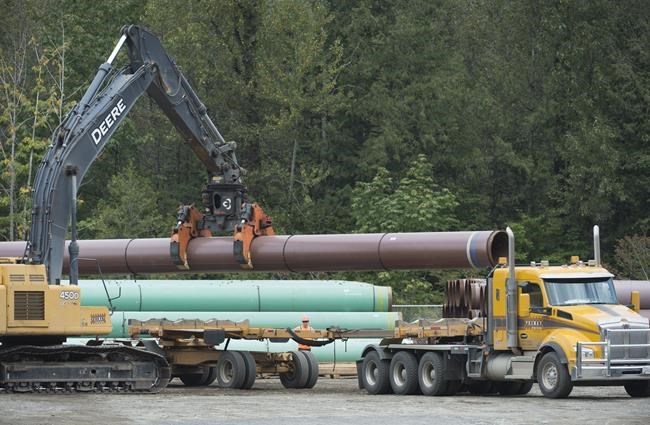CALGARY — An oil and gas industry group is laying the blame for a possible extended delay to the Trans Mountain pipeline project at the feet of Canada's regulatory system.
The Explorers and Producers Association of Canada, which represents 139 non-oilsands oil and gas companies, said Tuesday its members are frustrated by news that the pipeline, which was expected to be in-service early next year may now not be ready until December 2024.
That revised time frame was put forward as a worst-case scenario in fresh filings from Crown corporation Trans Mountain Corp., which is trying to get the Canada Energy Regulator to approve a route deviation.
If its request is denied and the company has to stick to its previously agreed-upon route and construction method, the company said Monday, the resulting delay in project completion could add close to $86 million to the pipeline's final price tag.
"It is a concern, there's no question. First, the delay, and second, the cost," said Tristan Goodman, president and CEO of the Explorers and Producers Association, in an interview Tuesday.
"But I think the fundamental question is, 'Why?' Why is this happening? And the answer ... which I think is relatively simple and I don't think is being discussed yet ... is this is an example of the federal government's regulatory and policy failure."
The Trans Mountain pipeline is Canada's only pipeline system transporting oil from Alberta to the West Coast. Its expansion, which is currently underway, will boost the pipeline's capacity to 890,000 barrels per day (bpd) from 300,000 bpd currently.
The pipeline — which was bought by the federal government for $4.5 billion in 2018 after previous owner Kinder Morgan Canada Inc. threatened to scrap the pipeline's planned expansion project in the face of environmentalist opposition and regulatory hurdles — has already been plagued by construction-related challenges and delays.
Its projected price tag has spiralled first to $12.6 billion, then to $21.4 billion and most recently to $30.9 billion (the most recent capital cost estimate, as of March of this year).
Now, Trans Mountain Corp. says it has run into engineering difficulties related to the drilling of a tunnel in B.C. It wants to alter the route slightly for a 1.3-kilometre stretch of pipe in the Jacko Lake area near Kamloops, as well as the construction method for that section.
But the company faces opposition from the Stk'emlupsemc te Secwepemc Nation, whose traditional territory the pipeline crosses and who had agreed to the originally proposed route and construction method.
The Canada Energy Regulator will hear arguments from both Trans Mountain and the First Nation at a hearing in Calgary next week.
Goodman said if the project is delayed, the biggest concern for oil shippers will come in the form of rising tolls -- the fees Trans Mountain wishes to charge oil shippers when the pipeline begins operations.
Oil companies are already pushing back against the higher tolls Trans Mountain says it will need to charge to help recoup ballooning capital costs. Goodman says any additional toll increases will put Canadian companies at an economic disadvantage to their global competitors.
But he said he doesn't blame Trans Mountain for the latest challenges the company has encountered with the Stk'emlupsemc te Secwepemc Nation. Rather, he blames Canada's regulatory system, which the energy sector has long complained puts too much pressure on companies alone to stave off every unforeseen roadblock or voice of opposition.
"Of course Indigenous communities and others that could be impacted definitely have to have a role," Goodman said.
"But instead of dealing with these issues from a leadership perspective at the federal level, it's being downloaded onto individual project proponents who are basically just businesses. That's not how this should work. That's not how it works in other countries."
Goodman said rather than scaring away investment capital by allowing private companies to get bogged down in a regulatory nightmare, the federal government needs to take responsibility for ensuring major infrastructure projects can be built.
"I think that's the main issue that at some point, the country's going to have to have a reckoning with," Goodman said.
"Or it's going to spill over into all other aspects of development, from coast to coast. It (Canada's regulatory system) has just become untenable."
While lengthy permitting timelines and regulatory uncertainty have been a thorn in the side of proponents of everything from major oil pipelines to liquefied natural gas (LNG) facilities, the issue has been raised by the clean energy sector as well.
In June, a report by the Business Council of Alberta warned that Canada's reputation as a place where major projects can't get built will make it difficult for the country to build the green infrastructure required to achieve its climate goals.
At the same time, a group of 18 different business, Indigenous, labour, environmental, and policy groups published an open letter to the federal government advocating for an improved approach to major project regulatory and permitting processes.
For its part, the federal government has acknowledged there is a problem, and has pledged to unveil a plan aimed at speeding up the permitting process for major infrastructure projects before the end of the year.
This report by The Canadian Press was first published Sept. 12, 2023.
Amanda Stephenson, The Canadian Press



